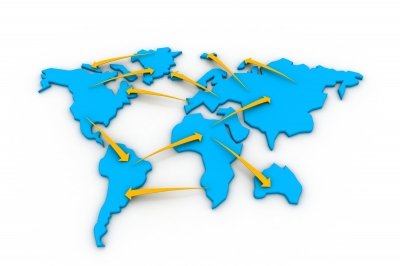
Nearly 800,000 American companies with fewer than 500 employees owe part of their revenue stream to international business.
Small business represent 99.7 percent of all employer firms and employ just over half of all private sector employees. [box_dark]Startling numbers right? In an economy that is struggling to produce jobs, for the last 15 years small businesses have generated 64 percent of all new jobs. While these statistics are impressive, many small businesses still find it extremely difficult to maintain during these hard economic times. [/box_dark]However, the overseas market has proven to be very lucrative for many entrepreneurs. According to business website Portfolio.com, nearly a quarter of American small-to-midsize businesses surveyed by The Business Journals report that they do business overseas, and they have significantly higher sales to show for their efforts.
The Business Journals’ survey also found that 23 percent of these company owners said they’re now doing business outside of the United States, nearly 800,000 American companies with fewer than 500 employees owe part of their revenue stream to international business.
Impressive though the numbers are, the actual percentage of foreign sales for all small-to-midsize U.S. businesses is still relatively small. Individually, businesses reported that only 4 percent of their sales are international, compared with 23 percent nationally, and 73 percent locally.
Jessica Gordon, international trade specialist with Mississippi Export Assistance Center for the U.S. Department of Commerce shares some insight to how small businesses can begin doing business internationally.
Savvy Life: How can small businesses utilize the U.S. Commercial Service to expand their services and products internationally?
Gordon: The U.S. Commercial Service is the trade promotion arm of the U.S. Department of Commerce’s International Trade Administration, it supports U.S. firms in launching or increasing their international business activities through providing market intelligence, trade counseling, and business matchmaking assistance, towards the goals of increasing U.S. exports and creating U.S. job opportunities.
A part of a global network of over 109 domestic offices and 128 offices located in U.S. embassies worldwide, U.S. Export Assistance Center offers local support to aid firms with promoting their products and services to foreign markets, helping them to become more competitive in the global marketplace.
Savvy Lifestyle: What type of companies would benefit the most from the Commercial Service’s services and programs?
Gordon: First, a company must be an established entity with at least one year of business experience, registered as a U.S. firm, and be able to certify that the products and/or services to be promoted through the U.S. Commercial Service contain a majority 51 percent U.S. content. Additionally, companies should have a product or service that has been successfully marketed and sold in the domestic market to fully benefit from CS programs.
U.S. firm, and be able to certify that the products and/or services to be promoted through the U.S. Commercial Service contain a majority 51 percent U.S. content. Additionally, companies should have a product or service that has been successfully marketed and sold in the domestic market to fully benefit from CS programs.
Other factors include: an international marketing plan with defined and measurable export goals; sufficient production capacity that can be committed to the export business; financial resources to actively support the marketing of the firms’ products in the targeted overseas markets; commitment by the management team to developing export markets and their willingness to dedicate staff, time, and resources to the export development process.
Savvy Lifestyle: How big is the exporting business in the U.S.?
Gordon: The U.S. Department of commerce reports that 95 percent of the world’s consumers live outside of the United States. Furthermore, U.S. exports of goods and services totaled $1.83 trillion in 2010. In Mississippi only, exports reached $8.2 billion in 2010. Mississippi lead export markets include Canada, Mexico, Panama, China, Afghanistan, Honduras, Belgium, Colombia, Brazil, and the Netherlands. Among Mississippi’s top exports include electrical machinery and equipment, tanning/dye, mineral fuel/oil, vehicles, wood, wood pulp, plastics, paper, furniture, aircraft, meat, and fertilizers.
Savvy Lifestyle: Is now a good time to consider doing business internationally?
Gordon: In recent times, with the passing of noteworthy free trade agreements, the Internet, and improvements in trade finance, access to world market has been increasingly improved. Companies who export have a greater chance in weathering downturns in the U.S. economy and are more likely to stay in business.
Savvy Lifestyle: Does the U.S. Commercial Service only help large corporations or can it assist small businesses as well?
Gordon: Exporting can be a lucrative business for companies of all sizes. The Small Business Administration (SBA) reports that the majority of new jobs created in the last decade were by small businesses. Thus, the SBA and U.S. Commercial Service aims to assist small to medium-sized firms with selling their products internationally in efforts to further stimulate the U.S. economy. As many smaller companies are focused on running the day-to-day operations of their companies, they may initially find exporting burdensome or challenging due to not knowing of the many export and financial resources offered by the federal and state government. The U.S. Export Assistance Centers are positioned in major cities throughout the U.S. to assist primarily small and medium-sized companies with developing their export business and managing every component of the export process.
Savvy Lifestyle: If a company is interested in utilizing Commercial Service resources what should they do?
Gordon: To learning more about Commercial Service programs and resources, small businesses should contact their local U.S. Export Assistance Center. Trade specialists are available to meet with registered companies. For companies throughout Mississippi they should contact the Mississippi U.S. Export Assistance Center at (601) 373-0784 or visit the MS USEAC’s website at http://export.gov/mississippi/







1 Comment
Thanks for sharing!